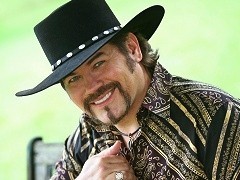Early in your career you played in a band called White Oak and you had the very same booking agent as Trace Adkins, is that right?
"We did, we had the same agency. Our booking agent was out in Dallas."
Do you get sometimes together with Trace to remember the old times?
"Every now and then and we run in each other and we talk, his wife and my wife are pretty good friends. So we go out to dinner every now and then. We did the St. Jude Bowling, it was Lonestar's bowling event that they do at Fan Fair. It was the last time I got to talk to Trace. He's a good guy."
You used to open shows for many great artists like Alabama, Mark Chesnutt, Ricky Van Shelton. What of these tours is the most memorable for you?
"Oh, wow. I've been fortunate to open a couple of shows for Charlie Daniels, that's always a treat. When I get to meet somebody I've been a fan of for a long time and especially get to open for him is always a big treat. Charlie, Kenny Rogers, I got to do a couple of shows with Kenny Rogers. That's like they forgot to lock the gates and let all the kids get in a candy store, that's how I feel when I get to work with an artist like that."
In the mid 90's you worked as a demo singer. Tell me more about this job. Is a demo singer hired by just one publishing company?
"Well, hopefully by several. But I worked as a studio singer, a demo singer, and for those people who don't know, demo is a short for a demonstration recording and what happens is that the writers of the song or the publishers of the song hire a band to go in the studio and a singer to go to record their song, to make a record of it and then they take and play the recording for guys like Alan Jackson, George Strait, try to get them to record it. So that's how I made my living, I sang over 4,000 demos in a space of about 8 years."
Did you sing any demo for Alan?
"I never sang any demos of Alan's. I sang a bunch of Randy Travis'. I sang a few of Aaron Tippin's and also sang something for Brad Paisley."
Which ones?
"You know it's been so long ago I can't remember. I just remember working on it in the studio."
And anything for George Strait? 'Write This Down', I guess.
"Yeah, 'Write This Down', I sang that demo. Gosh, Gary Allan cut a couple of things that I sang, one of his hits was 'The One'. Lee Ann Womack's 'Little Past Little Rock', I sang that demo. Trace cut a couple of songs that I sang demos on. And there's probably more out there that I don't know. Chad Brock cut a couple of things that I sang on. But as writers, I sang demos for guys like Randy Travis. I even did some things that Merle Haggard had covered it with Max D. Barnes and I got to do some stuff that Buck Owens had written with Harlan Howard. I was fortunate to get to meet those guys, but still got to record some of the songs."
Does it mean all the artists who were considering your recordings knew you were at the time?
"No, some of them I think knew about me. And whenever they heard a demo they'd go 'oh, that's Buddy Jewell singing that demo'. I remember meeting Joe Diffie in the studio. Joe heard a bunch of my demos. He was very complimentary towards me, which meant a ton to me because Joe's one of the greatest singers I think ever. So, it's always cool for me to meet guys like that, that are great singers and they're fans."
How many songs a day did you record?
"The most I ever did in one day I recorded ten songs at one time."
And how many takes did you usually need?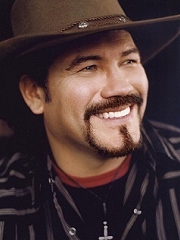
"Haha, too many to mention. If I was on a good day I could sing through the song about maybe four times and then go back and kind of pick like I'm gonna like this one, take one and then take four and then they let me fix a few things. Generally in about 45 minutes I could lay down a lead vocal and sang a couple of background parts, too."
And sometimes when there was a really great, great song, did you feel like 'I'm gonna keep it for myself'?
"Ha, I wished I could. There were a lot of great songs I got to sing on and said this is a good song, but I'll never get to record it. When I finally found my record deal through Nashville Star in 2003, there were a couple of songs that I really loved and that were still available, so I put those on my first album. The most of the good ones were already gone about the time I got to it."
Before Nashville Star you had gone through many other talent shows. When you entered Nashville Star, did you think that it might be something special, something that might change you life?
"Well, I never expected to win because I was the oldest guy on the show. I've been in Nashville for ten years at the time and I've been turned down by every major label in town several times. So I pretty much conceded the fact that I was long without a record deal, so I saw Nashville Star as a chance to maybe get on television. I had a little website, I had a couple of independent CD's and I thought maybe I'd get to sell some CD's, so my website would actually make money. But I never envisioned winning the whole thing and I thought they'd vote me off every Saturday night."
After five more seasons you're still the most successful contestant of the show with two records both peaking at #3, is that right?
"Honestly, I guess I'm the most successful winner, but I think that Miranda Lambert has sold more records that I have, but don't tell her that." (laughs)
All the other winners have even failed to reach Top 40.
"That's what I hear. It's a shame, you know." (editorial note: by the time of publishing this
interview this wasn't true anymore. Chris Young, Nashville Star winner 2006, earned his first #1 with 'Getting You There (The Black Dress Song)' on Oct 15, 2009)
Do you think that Nashville Star can really quarantee a good carrer and do you think you were just damn lucky?
"I was just very blessed. I think that God does things for a reason and I'm not so self-absorbed to think that he created Nashville Star just for me to win, I think that he opened the door for me the one I was going to and it was just a very special show for us the first year, unfortunately they failed to be able to kinda catch lightning in a bottle again the first year."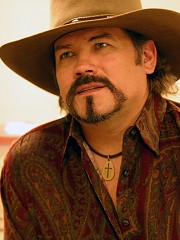
What advice would you give to a potential newcomer trying to break through in the business?
"Well, I think that's very important to be able to write your own music, I know it was a big benefit for me because I made of a lot money out of it, off my first hit. I wrote it by myself, I have the publishing on it, and those paychecks were very nice to get. So if you can write your own music, that's great, and I think it makes you even more attractive to a record label and also to the audience. I have a lot of fans that say we love all the stuff that you've recorded and we really like the stuff that you've written. That's a part of my advice, try to write your own stuff, even if you don't, find out who you wanna be, because there's already a Garth Brooks, there's already an Alan Jackson, you gotta be unique and be able to stand out from everyone else."
Your first album after Nashville Star was produced by Clint Black. How did you get to meet him and work with him?
"It was a deal that Clint and his management, whoever won, he was going to get to produce the album and he was also our mentor on the show, so I met him the very first night they moved us into the big house together, which was a thrill for me because I loved Clint as working, he's become a good friend and I had a great time making that first record with him."
When you reflect on the past five years, what do you consider as the greatest achievement in your career?
Well, I've had a lot of great things happenws to me, but honestly the first time I ever got to play the Grand Ole Opry, I don't think anything else tops that. I've been nominated for several awards, the ACM's, the CMA's and things like that, but to be able to walk out on that stage, I got a standing ovation the first time I played. I I went out, and when I left the stage, that to me there was no greater achievement."
Do you find it difficult to balance your career and your family life?
"Not so much now that I did the first couple of years. The first or two years I was so busy that I was gone more that I was home and now we've struck pretty even balance."
You've been supporting Peter Dula in a great way and I know that you are planning to do a duet.
"Yeah, we try to figure out how to write something together. Or maybe he will write something and I will and we can record it together. I look forward to that. I know he came to my fanclub party this year and he got up and sang 'Help Pour Out The Rain' with me at my fanclub party, which was a big treat for me and hopefully for him."
So you haven't decided what song to record yet?
"No, because of his health issues here recently, we just kind of put that on the back burner until he'll get strong and heatlhy and we'll see what happens after that."
Are you going to record your vocals here in Nashville and send it to him?
"Yeah, because I know that he and Joe Diffie did something similar. I'll send it back and forth over the Internet, right?"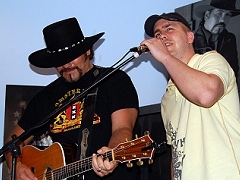
Actually their song is #1 in Europe just this week.
"Is it #1 this week? That's great. I'm really proud for Peter. He's done an amazing thing."
Are you going to tour Europe anytime soon?
"He's been trying to help me get a European tour going for next year. I don't know where we're gonna wind up I'd love to go to Europe next year, really I'd like to go over there and play this little acoustic tour and maybe take my family with me and they can, you know, sell T-shirts or whatever and we can have just a family vacation but also see Europe at the same time."
Do you know anything about me country, about the Czech Republic?
"Well, I just know it used to be Czechoslovakia and now it's the Czech Republic. I'm, like most Americans, very ignorant about your country, Petr. But I'm willing to learn. I know there are some very nice people from your country including you."
Thank you. Do you know any famous Czech people?
"I'm sure there are several hockey players, that's the first answer you get, isnt't it?" (laughs)
That's very true! Thanks for the interview!
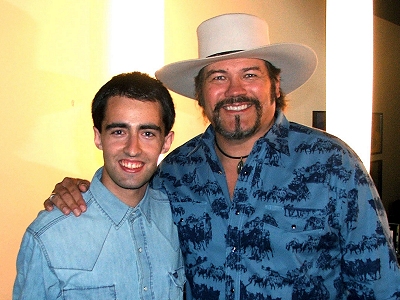
A greeting from Buddy Jewell
(C) Petr Mecir 2010. All rights reserved.




